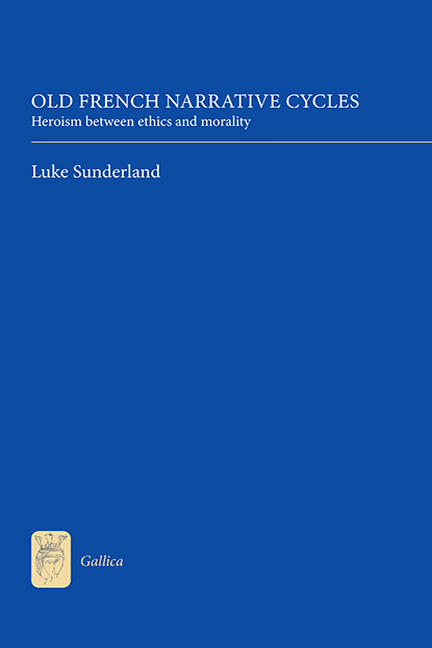Book contents
- Frontmatter
- Contents
- Dedication
- Acknowledgments
- Manuscripts of the Cycle de Guillaume
- Manuscripts of the Roman de Renart
- References and Abbreviations
- Introduction
- 1 Duty to the Geste: The Cycle de Guillaume d'Orange
- 2 Metaphor, Metonymy and Morality: The Vulgate Cycle
- 3 Responsibility to Reputation: The Prose Tristan
- 4 Ethical Evil: The Roman de Renart
- Conclusion
- Bibliography
- Index
- Miscellaneous EndMatter
- Frontmatter
- Contents
- Dedication
- Acknowledgments
- Manuscripts of the Cycle de Guillaume
- Manuscripts of the Roman de Renart
- References and Abbreviations
- Introduction
- 1 Duty to the Geste: The Cycle de Guillaume d'Orange
- 2 Metaphor, Metonymy and Morality: The Vulgate Cycle
- 3 Responsibility to Reputation: The Prose Tristan
- 4 Ethical Evil: The Roman de Renart
- Conclusion
- Bibliography
- Index
- Miscellaneous EndMatter
Summary
In the Introduction, I noted the general neglect of cycles by modern critics – there are few studies treating the material as cyclical wholes, with an overall tendency to chop cycles up for analysis, and in some cases overt distaste for cycles and preference for twelfth-century versions of the same stories. One explanation for this might be that three of the four cycles of my corpus – the Guillaume, the Vulgate and the Tristan – favour heroes who work first and foremost to continue the plot, thus generating austere pages of endless quests. They also undermine romantic ideals and distrust the sublime; they recognize its beauties and appeal but also associate it with dangerous disconnection from the symbolic order and with the horrors of the beyond. Thus in the Guillaume, Vivien's martyrdom is a great spectacle, yet he is nonetheless replaced by other heroes who serve the cause by remaining staunchly committed to this world. In the Vulgate, Galehaut and the damoisele d'Escalot, sublime martyrs, are merely brief flirtations with the ideal of sacrificial deaths, whereas the Tristan finds space to narrate Kahedin's tale, but only to make clear that giving one's life for love is not the way to be heroic.
These cycles, then, tend to the perverse rather than the sublime. They use perverse energies to make characters masochistic servants of le bien (the ‘good’), to make them serve the collectivity, the community, to connect them to the symbolic. This is a response to the ambivalent nature of heroes, who are by definition problematic figures who defy norms and break rules. The moral frameworks of the cycles work to ensure that any excessive or dangerous heroic behaviour is tied into an overall cause, an ultimate ‘good’. In the Guillaume, there is only one idea of the good – Christendom must be defended against Saracens and expanded by seizing their lands – and the only question is how best to serve this cause. Aymeri, Vivien, Guillaume are alternative templates for the geste that does its duty, with even the jubiliant violence of Rainouart offering only a brief respite from the government of morality. The Tristan shares with the Guillaume apparent confidence about what the good is.
- Type
- Chapter
- Information
- Old French Narrative CyclesHeroism between Ethics and Morality, pp. 176 - 180Publisher: Boydell & BrewerPrint publication year: 2010



